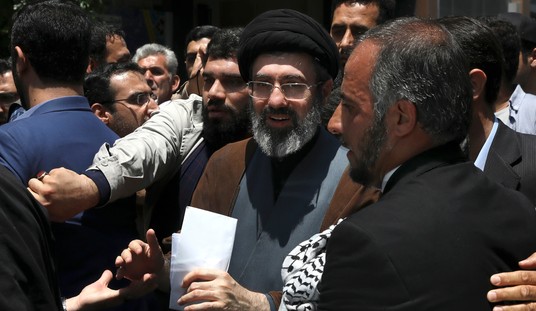We knew this before we knew it. As far as I’m aware, none of the major corporations squawking about Georgia’s law lately undertook a serious lobbying effort to oppose it before it passed. Delta actually praised the law in its first statement after Brian Kemp signed it, noting that it “improved considerably during the legislative process, and expands weekend voting, codifies Sunday voting and protects a voter’s ability to cast an absentee ballot without providing a reason. For the first time, drop boxes have also been authorized for all counties statewide and poll workers will be allowed to work across county lines.” Shortly thereafter lefty activists grabbed the company by the lapels and urged it to reconsider its assessment, which Delta duly did.
At least Delta offered input on the law during the drafting stage, though. Georgia legislators who spoke to NRO’s Ryan Mills told him that Major League Baseball didn’t give a rip about the bill while it was being debated. No meetings, no comments, zip. Not until it passed and Joe Biden declared that he’d “strongly support” moving the All-Star Game from Atlanta in protest did the league conclude that the law was an offense to God and man.
If MLB cared about voting rights, why didn’t it intervene when it had a chance to influence the legislation? Answer: Because it didn’t care until the left told it to.
“I do not recall any interaction with Major League Baseball for sure, and I do not recall any interactions with anybody representing the (Atlanta) Braves organization the whole time that we were debating and working through the bill,” said Barry Fleming, the state representative who sponsored the House version of the election bill…
“I talked to the commissioner, offered to explain anything he wanted in the bill, because I heard they were getting pressured. He thanked me for that,” [Brian] Kemp said. “And then I got a call saying they had moved the game. No dialogue whatsoever, which is just disappointing.”…
Between the House and Senate, [Fleming] said, there were about 20 hearings on the proposal when MLB officials also could have weighed in. If MLB was dissatisfied with the legislation, “we certainly could and would have made changes along the way,” Fleming said.
Fleming did meet with other business leaders, just none from MLB because MLB didn’t care. They moved the game from Atlanta due to a progressive pressure campaign, not because they have any sincere objections to the law — not a single provision of which they have yet to identify as especially troubling, by the way. In fact, Mills notes, other states like Ohio and Florida that hosted the All-Star Game recently have voting laws that aren’t dissimilar from Georgia’s and which have been criticized in various respects by liberal activists. MLB didn’t care. Until now.
And if the answer to that is, “It wasn’t until last year that one party tried to disenfranchise millions of voters by overturning the election so go figure that voting rights are now a priority,” it only brings us back to the original question. If MLB’s consciousness about voter access had been raised by the “stop the steal” fiasco, why wasn’t it seeking to influence Georgia’s new law while in development?
My theory all along has been that they probably would have kept the game in Atlanta notwithstanding the pressure from leftists if not for Biden coming out publicly and saying he’d support moving it. They had cover on their left flank from Stacey Abrams and Jon Ossoff to decline a boycott, but once the president raised the stakes it was destined to become an issue that would follow the league and its players for months. This WaPo piece lends some support to that theory. Biden’s comments about the game shook things up — to the chagrin of Georgia Democrats:
“I think he probably should not have weighed in,” said Jacquelyn Bettadapur, chair of the Cobb County Democrats. “As push came to shove, I know some of the local elected officials were disappointed that he weighed in.”
Influential Georgia Democrats reached out to the White House shortly after Biden’s remarks to indicate it was not their preferred message, according to three people with knowledge of the situation, who spoke on the condition of anonymity to describe the interactions. The conversations reached high levels at the White House, involving Deputy Chief of Staff Jen O’Malley Dillon…
After Biden’s remarks, representatives of Abrams, Ossoff and other Georgia Democrats made contact with the White House officials to highlight their opposition, according to the people familiar with the situation. The point of the conversations was not to fault Biden but to get on the same page and stress that many Democrats in Georgia were still eager to keep the game in the state, the people familiar with the talks said.
That was also my guess to explain Biden’s otherwise inexplicable ambivalence when he was later asked about boycotting the Masters and declined to take a position. It’s incoherent to want the All-Star Game out of Atlanta to punish Georgia for its new law but not want golf’s most celebrated tournament out of Augusta. The only way to reconcile those positions is in terms of pure pressure: Local Democrats complained to Biden after MLB walked away and told him to stop calling for boycotts lest the party get wiped out in Georgia in 2022. So he did. No logical consistency required.
Atlanta’s loss is Brian Kemp’s gain, though. Maybe?
Voting Law Strengthens Brian Kemp’s Standing With Georgia Republicans. Is It Enough to Stop a Divisive Primary? https://t.co/RlS6pTsBvY via @eyokley pic.twitter.com/6WhstIITeq
— Morning Consult (@MorningConsult) April 8, 2021
I can’t imagine Trump forgiving Kemp for not overturning Georgia’s results last fall just because Kemp momentarily has the right behind him in a culture-war battle with MLB and other companies. He’s sworn revenge too many times for that, and in fact criticized Georgia’s law a few days ago for not having gone far enough in tightening voting rules. “Kemp also caved to the radical left-wing woke mob who threatened to call him racist if he got rid of weekend voting,” Trump said in his statement. “Well, he kept it, and they still call him racist!” There’ll still be a Trump-led primary challenge to Kemp and the challenger will still be the favorite. Although maybe a bit less so than he would have been two weeks ago.
In lieu of an exit question, go read Rich Lowry about the time Stacey Abrams in her role as state legislator helped cut the period of early voting in Georgia in half. She had sensible reasons for doing so, namely that the expense involved in staffing so many voting days was onerous for smaller counties, but any new limitation on voting rights is an abomination, we’re now told. What changed?








Join the conversation as a VIP Member